In setting timelines for Governors to act on Bills presented to them by the state legislatures, the Supreme Court has, for the first time, prescribed that the President should take a decision on the Bills reserved for consideration by the Governor within a period of three months from the date on which such reference is received.
It said “in case of any delay beyond this period, appropriate reasons would have to be recorded and conveyed” to the state concerned.
Calling for a decision within three months is significant because under Article 201 of the Constitution no timeframe has been set for a Presidential decision.
Making available Friday its April 8 ruling that declared as illegal and erroneous the action of Tamil Nadu Governor R N Ravi in reserving 10 Bills for consideration of the President in November 2023 after they had already been reconsidered by the state Assembly, the bench of Justices J B Pardiwala and R Mahadevan said “it must be made clear that the Courts would not be powerless to intervene in cases where the exercise of function by a constitutional authority is not being done within a reasonable time”.
It said “where the Governor reserves a Bill for the consideration of the President and the President in turn withholds assent thereto then, it shall be open to the State Government to assail such an action before this Court”.
Writing for the bench, Justice Pardiwala noted that under Article 201, the President has two options once a Bill is reserved by the Governor for his/her consideration – grant or withhold assent.
The bench said “one of the features of Article 201 which have been the cause of differences in Centre-State relations over the years” is the absence of a time-limit within which the President is required to declare the grant or withholding of assent once the Bill is reserved for his/her consideration by the Governor.
Story continues below this ad
It said the Sarkaria Commission had pointed to this and “recommended that definite timelines must be adopted for facilitating the efficient disposal of references under Article 201” and that “the reading of a timeline in Article 201 was also suggested by the Punchhi Commission”.
The Sarkaria Commission, headed by former Supreme Court judge Justice R S Sarkaria, was set up in 1983 to review the working of the existing arrangements between the Union and the States. The Punchhi Commission too was on Centre- State relations and was set up in 2007 under former Chief Justice of India Justice M M Punchhi.
Interpreting the exercise of powers under Article 201, the bench said “while the language of Article 201 does not provide for any timelines within which the President is required to act, the absence of a time-limit cannot be construed as indicating that the discharge of functions by the President under the said Article can be done without due deference to the important nature of the role they occupy as regards the legislative machinery of the State. Any Bill(s) reserved for the consideration of the President cannot become an Act unless it receives the assent as is mentioned in Article 201, and thus, long and undue delays in the disposal of references by the President would have the effect of keeping the Bill(s), which are an expression of the popular will embodied by the State legislature, in an indefinite and uncertain state of abeyance”.
The ruling said “although we are cognisant of the fact that in discharge of his powers under Article 201, the President is expected to ‘consider’ the Bill and such ‘consideration’ may be difficult to be bound by strict timelines, yet it cannot be a ground to justify inaction on part of the President”.
Story continues below this ad
It said “delay on part of the President in deciding a reference under Article 201, without any justification or necessity, would fall foul of the basic constitutional principle that the exercise of a power must not be arbitrary and capricious. The implications of inaction being of a serious nature and detrimental to the federal fabric of the Constitution, there should be no scope for unnecessary delay on part of the President under Article 201 as well.”
The court, in this context, also referred to two Office Memorandums (OMs) issued by the Ministry of Home Affairs on February 4, 2016 to all Ministries/Departments of the Government of India regarding the “expeditious disposal of State Bills reserved for the assent of the President.”
It said that perusal of the first OM for “expeditious examination and disposal of State Legislative proposals by the Central Ministries/Departments/State Governments …makes it clear that a timeline of three months has been prescribed for the decision on Bills reserved for the President. A time limit of three weeks has been prescribed for the disposal of ordinances of an urgent nature.”
The judgement said “it becomes clear upon the perusal of the guidelines that in recognition of the urgent and important nature of Article 201, the Central Government has framed clear guidelines as regards the time limits and the manner in which references under Article 201 are expected to be disposed of” and that “the factum of its (OMs) existence and acceptance reveals that the requirement of expeditious or even a strict time-bound action would be consistent with the aim and object of Article 201.”
Story continues below this ad
It said “the recommendations made by the Sarakaria and Punchhi Commissions respectively and the guidelines framed by the Central government taken collectively indicate the expediency involved in the disposal of references under Article 201 along with the importance of the role of the President. In this backdrop, it must be made clear that the Courts would not be powerless to intervene in cases where the exercise of function by a constitutional authority is not being done without a reasonable time.”
The bench said, “We, therefore, deem it appropriate to adopt the timeline prescribed by the Ministry of Home Affairs in the aforesaid guidelines, and prescribe that the President is required to take a decision on the Bills reserved for his consideration by the Governor within a period of three months from the date on which such reference is received. In case of any delay beyond this period, appropriate reasons would have to be recorded and conveyed to the concerned State. The States are also required to be collaborative and extend co-operation by furnishing answers to the queries which may be raised and consider the suggestions made by the Central government expeditiously.”
The judgement said that like in the case of the Governor, the President too does not have the power to exercise absolute veto and hence the latter’s decision to withhold assent “must” also “be accompanied by sound and specific reasons that necessitate the withholding.”
“While… we have elaborated that the Governor does not hold the power to exercise ‘absolute veto’ on any Bill, we see no reason why the same standard would also not apply to the President under Article 201 as well. The President is not an exception to this default rule which permeates throughout our Constitution. Such unbridled powers cannot be said to remain in either of these constitutional posts.”
Story continues below this ad
“The only exception that has been carved out by the Constitution as regards the exercise of powers by the Governor and that of the President under Article(s) 200 and 201 of the Constitution is that in the former, the Governor once having withheld assent from a Bill would then be bound to assent upon the reconsideration of such Bill, whereas in the latter no such compulsion is constitutionally imagined for the President, owing to the very fact that the grant or withholding of assent in terms of Article 201 is not the ordinary law-making procedure so far as the States are concerned,” it stated. An “extraordinary situation” only arises, the bench said, “wherever policy considerations are involved in an otherwise State legislation but nevertheless having the propensity of a pan-country effect that is necessitated by the very quasi-federal nature of our polity”.









